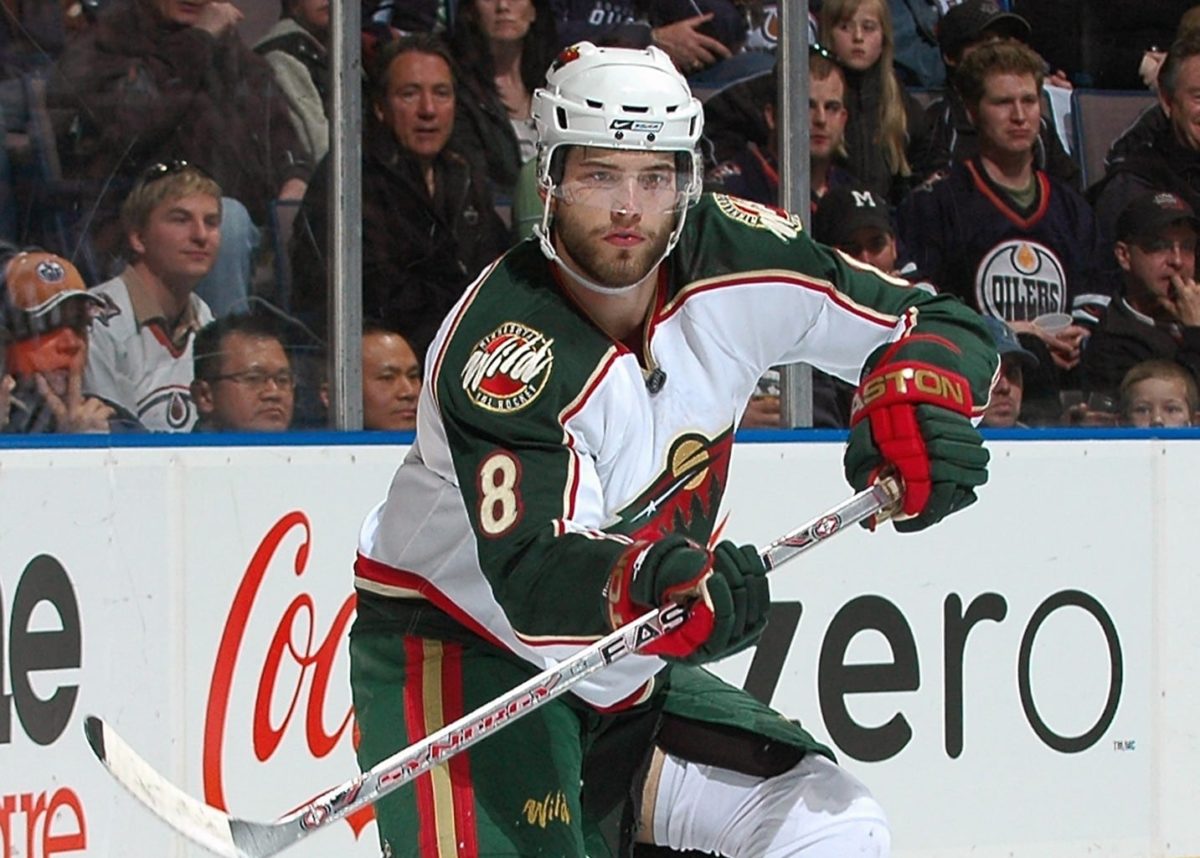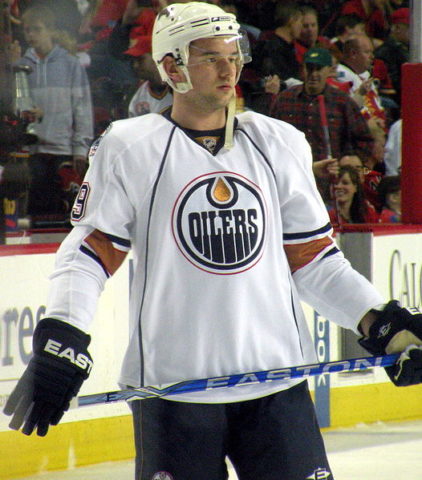The fourth installment in this series has arrived after previously looking at how the Minnesota Wild did in their first three drafts. If you missed any of them or want a refresher, you can find those recaps below:
- 2000: Franchise’s Inaugural Draft
- 2001: Minnesota Gets Its Captain
- 2002: Late Round Woes
There was excitement in the air as the Wild entered the 2003 NHL Draft. The team had come off of its most successful season thus far, qualifying for the playoffs for the first time in franchise history. The Wild didn’t disappoint in their first season, making it all the way to the Western Conference final. They ended up getting swept by the Mighty Ducks of Anaheim, but it was still an impressive run for a team that just entered the league a few seasons before that.
By the end of the draft, the Wild had made nine selections. Up to this point, the Wild have been solid at drafting in the first couple of rounds, but their later-round picks have always left a lot to be desired. Could the same be said about their success or lack thereof at the 2003 draft? Continue reading to find out.
Early Rounds (1st and 2nd)
Round 1, 20th Overall – Brent Burns, D (Brampton Battalion, OHL)
This year’s draft was the first time that the Wild were drafting outside of the top-10. However, that doesn’t mean they get one of the better players from one of hockey’s greatest draft classes. With the 20th overall pick, Minnesota selected Brent Burns from the Brampton Battalion of the Ontario Hockey League. Some people may not know that he actually played his lone OHL season as a right-winger before Wild head coach Jacques Lemaire converted him to being a defenseman.
Burns’ NHL career began the very next season, suiting up in 36 games for the Wild in which he registered six points. He spent the following lockout season with the Houston Aeros of the American Hockey League before making the full-time jump to the Wild’s roster in 2005-06. The Barrie, Ontario native, continued to steadily improve, showing flashes of offensive brilliance until he hit the 40-point mark for the first time in his career in the 2007-08 NHL season (15 goals, 28 assists).

Unfortunately, injuries stopped Burns from hitting his stride following his breakout season. He played just 106 out of a possible 164 games the next two seasons. Burns returned to full health for the 2010-11 campaign, scoring what was a career-high at the time of 17 goals. That’s actually a franchise record for Wild defensemen to this day, showcasing just how special of a talent he is. However, this impressive season wound up being his last in Minnesota.
At the 2011 NHL Draft, the Wild traded Burns and a 2012 second-round pick to the San Jose Sharks in exchange for Devin Setoguchi, Charlie Coyle and a 2011 first-round pick (that was used to select Zack Phillips). It’s still a trade that many Wild fans regret to this day, especially with how Burns developed with the Sharks. He’s had seven seasons where he’s had at least 45 points since the trade, including a five-year stretch that saw him hit anywhere between 60 and 83 points. He’s won the James Norris Trophy with San Jose back in 2017 and was a finalist for the award twice. At the end of the day, there won’t be many people who’d argue against the fact that Burns is one of the best offensive defensemen the NHL has seen in the last 20 years.
While Burns’ time with the Wild was short, he left a mark on the franchise that won’t be forgotten any time soon. There’s no telling where his career would’ve gone had Lemaire never pushed him to play defense. Burns’ 183 points with the franchise still rank fourth all-time among Wild defensemen and he hasn’t played there in a decade. Talents like him only come around now and then, so, fortunately, the Wild had him for as long as they did.
Round 2, 56th Overall – Patrick O’Sullivan, LW (Mississauga IceDogs, OHL)
At one point, Patrick O’Sullivan was projected to be a top-5 pick in the 2003 NHL Draft; however, personal and abuse issues with his father caused him to fall to the Wild in the second round. After all, he recorded 173 points in 124 in the two seasons leading up to his draft year. After being drafted, O’Sullivan remained in the OHL for two seasons before making his pro debut with the Aeros during the 2005-06 season. He proved that his success at the junior level was no fluke, putting up a franchise-record 47 goals.

Unfortunately for Wild fans who wanted to see more of O’Sullivan, he was traded with a 2006 first-round pick to the Los Angeles Kings for the now-late Pavel Demitra. While Demitra had a couple of productive seasons in Minnesota, it was never enough to put the team over the hump into becoming Stanley Cup contenders.
O’Sullivan, on the other hand, never reached his full potential at the NHL level. After an impressive 53 points in 82 games for the Kings in 2007-08, injuries and trades prevented him from finding consistency. He was never with a team for more than three seasons and couldn’t seem to find the offensive flair that he was known for in his early career. Eventually, O’Sullivan did find his way back to the Wild in 2010 when they claimed him off waivers. He only stuck around for 21 games, recording seven points, while spending most of his time in the AHL.
O’Sullivan joined the then-Phoenix Coyotes in 2011; however, most of that season was spent in the AHL. He played some hockey in Finland for a season before retiring in 2013.
Unfortunately, the hockey world will never get to see what O’Sullivan’s potential truly was. Yes, projected top-5 picks can slip all the time, but it’s clear that O’Sullivan had the skills to perform at a high level, as seen by his first full NHL season.
Middle Rounds (3rd – 5th)
Round 3, 78th Overall – Danny Irmen, RW (Lincoln Stars, USHL)
The first United States Hockey League player the Wild ever drafted, Danny Irmen looked impressive in his draft year. He had 21 goals and 34 assists in 45 games, prompting Minnesota to select him in the third round. His connection with the state grew as he attended the University of Minnesota for the following three seasons. Irmen made the jump to the pro level in the middle of the 2005-06 NHL season, joining the Aeros on a tryout for the remainder of their season.
After spending the next several seasons with the Aeros, Irmen finally made his NHL debut in the 2009-10 season. However, he failed to impress and only ended up playing two games. That was the first and last NHL action that Irmen saw as he spent the rest of his career playing in Europe before retiring in 2017. At the end of the day, he’s just one of the many Wild draft picks who didn’t end up amounting to much in the NHL.
Round 5, 157th Overall – Marcin Kolusz, C (Novy Targ, Poland)
After going nearly 80 picks without drafting a player, the Wild settled on Polish center Marcin Kolusz at No. 157. He was coming off a season that saw him record six points in 30 games for Novy Targ in Poland. Following his draft year, Kolusz decided to see how he’d play on North American ice by joining the Vancouver Giants for the 2003-04 Western Hockey League season. The move didn’t work out as well as he would’ve liked to, as he ended his lone WHL season with 18 points.
Kolusz returned to Europe for the following season, never having reached a deal with the Wild. Still, he went on to have a successful international hockey career. Kolusz had stints in multiple European countries, often wearing a captaincy letter of sorts wherever he went. He’s currently playing for Michalovce Dukla HC in Slovakia and is seen today as one of the best Polish hockey players of all time.
Late Rounds (6th – 9th)
Round 6, 187th Overall – Miroslav Kopriva, G (Kladno, Czech)
Miroslav Kopriva had some pretty impressive stats in his draft year. With a 1.95 goals-against average and .937 save percentage with Kladno’s under-20 team, it’s no surprise that the Wild used a sixth-round pick on him. He came over to North America for the 2005-06 season; however, he spent it with the Aeros as a backup option. Kopriva continued toiling in the minors for the next few seasons before returning to Kladno in 2007-08. He’s since spent the rest of his career in Europe and is currently scheduled to play for HC Letci Letnany in the 2021-22 season of the Czech3 league.
Round 7, 207th Overall – Georgi Misharin, D (Yekaterinburg Dynamo, Rus-1)
Drafted 207th overall in the seventh round, Russia’s Georgi Misharin was the first defenseman that the Wild selected this year. Misharin decided to come over to North America to play for the Saginaw Spirit in the OHL for the 2003-04 season. He ended up producing well for a defenseman, scoring five goals and adding 22 assists. Unfortunately for Wild fans, that’s the only glimpse of Misharin on North American ice that they’d get to see. He promptly returned to Russia during the 2004-05 lockout and now plays for Torpedo Nizhny Novgorod of the Kontinental Hockey League.
Round 7, 219th Overall – Adam Courchaine, C (Vancouver Giants, WHL)
Adam Courchaine looked like a promising prospect entering the 2003 NHL Draft. Despite some concerns about his size, he scored a total of 283 points in 285 WHL games. Courchaine made his Aeros debut in the 2005-06 season, however, he remained pointless in 10 games. He finished off the rest of the year in the ECHL before continuing the rest of his hockey career in Europe. He spent time in countries such as Denmark, Austria and even England before calling it a career in 2018.
Round 8, 251st Overall – Mathieu Melanson, R (Chicoutimi Sagueneens, QMJHL)
After an impressive 47-point rookie season for the Chicoutimi Sagueneens of the Quebec Major Junior Hockey League, the Wild used the No. 251 pick on Mathieu Melanson. The French winger spent the next four seasons in the QMJHL until attempting to go pro in 2006. Unfortunately for him, Melanson was mostly ECHL-bound and never saw any action with Minnesota. He played eight games for the Manitoba Moose in the AHL, but that was the closest he got to the NHL. Melanson returned in 2013 after playing one season for the Riviere-du-Loup 3L of the Ligue Nord-Americaine de Hockey.
Round 9, 281st Overall – Jean-Michel Bolduc, D (Quebec Remparts, QMJHL)
Jean-Michel Bolduc was a product of his time. The 6-foot defenseman was as tough as they come, racking up 164 penalty minutes in his draft year with the Quebec Remparts. The Wild figured they’d take a swing on him in the ninth round, seeing as there’s minimal risk involved with a pick that late. To no one’s surprise, Bolduc never made it to the NHL or even the AHL. As soon as he finished his junior career, he joined the LNAH, spending the rest of his hockey days as one of the tougher players in the league. Beyond that, Bolduc’s career is what you’d expect from a ninth-rounder.
Overall Grade: D
While the 2003 draft is seen as one of the best in NHL history, however, it didn’t work out that way for the Wild. Out of their nine selections, only three saw time in the NHL and most of those games were played by Brent Burns who didn’t even hit his superstardom until after leaving Minnesota. Regardless of how you look at it, this draft was a bust for the Wild, especially after a conference finals appearance.